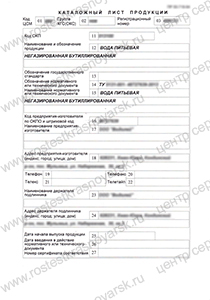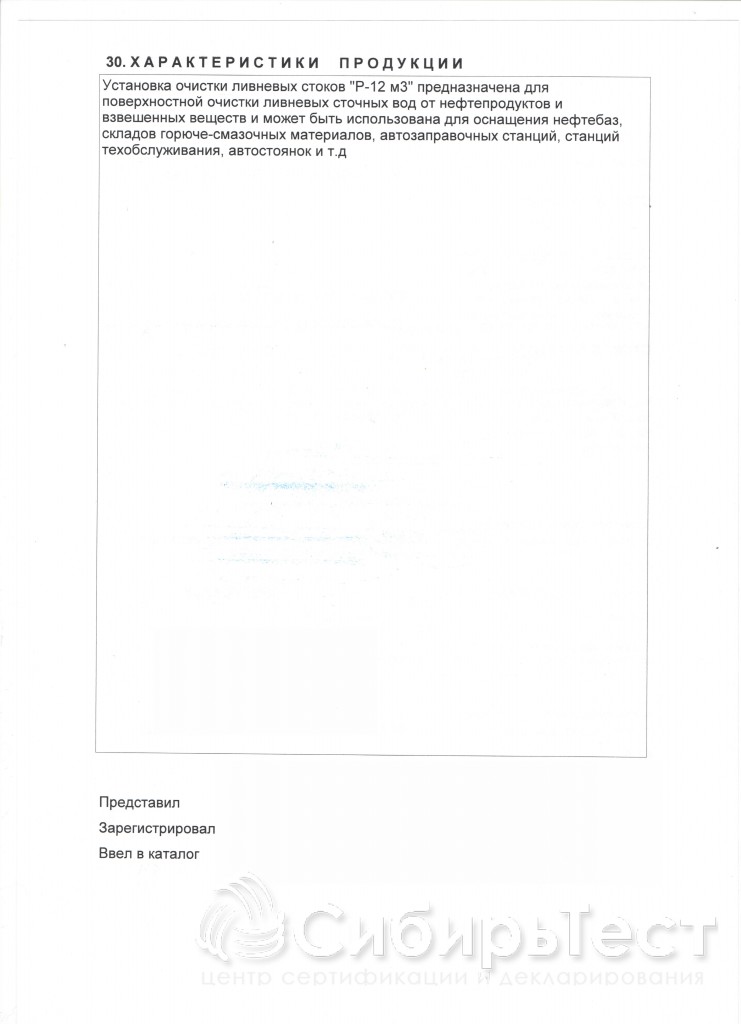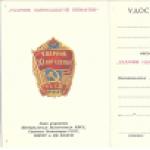State Register of Technical Specifications
Specifications (TU) - set technical documentation, which defines the requirements for manufactured goods, for services provided, for existing processes. The development of technical specifications can be carried out on certain types services, products. Registration of specifications can be both for single goods and for the same type of product groups.
Specifications are developed both for a substance or material, and for products. Registration of technical specifications can be performed only if the requirements of this document do not contradict the requirements of existing (current) state standards established for this product.
Specifications can be either part of the standard or self-documentation. If there is no current state standard for the product, then the technical specifications may be required by the certification authorities: without the Technical Specifications that have been registered by the technical specifications, the conformity assessment procedure cannot be carried out.
Currently, registration of technical specifications does not apply to mandatory procedures. Prior to the adoption of the Federal Law "On Standardization", the Technical Specifications were subject to compulsory registration TU (according to GOST 2.114). Mandatory state registration of technical specifications has been canceled since 1995. Currently, this is a voluntary procedure.
Mandatory registration is subject to the Technical Conditions for food products(according to GOST R 51740-2001). It is obligatory to register TS also for products related to the following field of activity:
- medicinal products
- medical products and products;
- cosmetic products;
- chemical products.
The presence of registered technical specifications in these areas is necessary due to (including) the requirement of state registration of certain types of goods with Rospotrebnadzor.
Registration of technical specifications is carried out in certification bodies accredited by Rosstandart (starting from the end of 2012 - Federal Service RF accreditation). Before registration, the Specifications must be agreed:
- with expert bodies operating in a particular area;
- with authorities state control and supervision, controlling different kinds the risks associated with the products in question;
- with an acceptance commission during the commissioning of new capacities.

Before registering TS, accredited organizations or their regional representative offices conduct an examination of the compliance of the submitted TS with the state standard GOST 2.114. If necessary, make changes to them.
If the document receives all conciliatory visas (with a positive result), then it is entered in the appropriate state register. The registering organization must draw up the title and catalog pages in the right way: the appropriate marks are put and certified with a seal.
Based on the information contained in the title of the Technical Specifications, which have been registered by the TU, information about them is entered into a single information database. It is available for viewing the catalog of valid specifications in a particular industry or activity.
At present, in Russia, any importer of goods or manufacturer can develop Specifications for their own use. Such documents are intellectual property developer company. If technical specifications do not require mandatory registration, then their holder can independently dispose of them:
- sell TU;
- transfer TS to other legal entities;
- restrict access to technical specifications of third parties;
- prohibit the use by third parties;
- voluntarily register technical specifications;
- enter your specifications in the Unified Register.
Registration of technical specifications, including voluntary, leads to the protection of copyright for the developed technical specifications; facilitates the procedures for passing certification examinations of production.

Specifications are a fairly important regulatory and technical document of an organization that is a manufacturer of products. It is in this document that the manufacturing technology of the product, its composition, storage and transportation conditions are prescribed. The development and registration of Specifications is necessary when there is no suitable GOST for the final product.
Such a document as TS is the property of the organization, its internal document. That is why its unauthorized use is considered illegal. The development and registration of technical specifications can be carried out either by the enterprise itself, or by a third-party organization at the request of the manufacturer. Practice shows that this process is carried out more reliably and faster with the help of professionals who know all the nuances of this action.
The complete process consists of the following steps:
- development of technical specifications;
- coordination of specifications with regulatory authorities and directly with the customer;
- state registration of technical conditions.
Specifications can be developed either for one or for several products, substances, materials. All requirements of TS should not contradict those requirements that are prescribed in the Technical Regulations, GOSTs and other state legal documents. Each individual Technical Specification is assigned an individual number consisting of four sections. After that, the specifications are certified with a seal, and the head of the enterprise approves this document.
Specifications are not subject to mandatory registration, regardless of the product, but it is better to register the specifications for unique products so that no one can use these specifications without the permission of the copyright holder. These actions can be performed only by those organizations that are accredited by the Federal Agency for Technical Regulation. In this case, registration must be carried out at the regional branch, directly at the location production areas organizations. State experts carry out a full check of the developed specifications, after which they are submitted for registration. In the process of registration of the Technical Specifications, both the title page of the specifications and the catalog sheet are marked by the organization that conducts the registration, and a special seal.
There are requirements approved by the state that apply to the Specifications. They are spelled out in GOST R 51740 and GOST 2.114-95. For most types of manufactured products, there are no requirements for mandatory registration of technical specifications. However, many manufacturers do it, as it avoids difficulties in the certification of production and also protects the company from theft of technical specifications and their use by competitors.
For the products listed below, registration is required by the inspection bodies in order to participate in tenders and as a condition for cooperation with most government organizations due to the seriousness and importance of this product.
- chemical products;
- food products;
- medicinal products;
- cosmetic products.
Registration and development of Specifications is carried out either at the request of the consumer, or at the discretion of the manufacturer.
Any product that is not regulated state standards, requires mandatory availability of formalized specifications on her. In order for technical specifications to be officially registered, the document number must be entered in the register of technical specifications. Only in this case it will be possible to assert about the successful registration of the document and its entry into force. Only those bodies that have received appropriate accreditation from the State Standard have the right to register technical specifications. The registering authority completes this process by affixing seals on the title page of the document.
To register TU, you must submit the following documents:
- TU in the form of a brochure in two copies. The title page must be drawn up in accordance with all the rules and the document number and the name of the product must be affixed to it.
- Catalog sheets.
- Card of the enterprise-holder of technical conditions.
The TU number consists of the following parts:
- The first part - the first 4 digits of the OKP code of the goods (taken from the All-Russian classifier of products);
- The second part (3 digits) is the product code assigned by the manufacturer;
- The third part (8 digits) - the code of the manufacturer according to OKPO - all-Russian classifier organizations;
- The fourth part (4 digits) is the year of approval of the specifications.
The need for registration and subsequent registration of technical specifications for products in the bodies of Rosstandart makes it possible for the consumer to have information about the product - its quality and the available nomenclature. As for the registration of technical specifications by the bodies of Rosstandart, they must be located on the same territory as the body that developed and approved the order document. This rule is not required for implementation if there is a need to register not the technical specifications themselves, but changes to them. In this case, you can contact any body of Rosstandart, which is located on the territory of the organization, which is the official holder of the original TU.
The catalog sheet is compiled both when registering technical specifications and when registering changes. It contains the following data:
- information about the applicant;
- Name of product;
- number of technical specifications;
- a brief description of products;
- scope of product use;
- warranty periods;
- date of release of the first batch of goods.
The organization that is taken, from the moment work begins on the document, is responsible for the accuracy of the data entered into the catalog sheet, including amendments.
After approval by the development organization of ready-made specifications (or changes to specifications), within one calendar month, the document must be registered with any accessible body of Rosstandart. After the receipt of the technical specifications, the authorized registration body has 15 calendar days to carry out the full procedure, which it undertakes to complete. After that, the applicant receives ready-made and already officially registered technical specifications: the original is transferred to him, and a copy of the specifications, with a seal, date and number affixed to the title page, remains with the body that completed the registration.
It is important to note that registration is optional for certain products. These include:
- cosmetic products;
- food products;
- medicinal products;
- chemical goods.
The absence of the need to register specifications does not mean that this procedure is prohibited. If the manufacturer decides to reserve the right to apply the Technical Specifications to secure the document from theft and use by competitors, he can apply for registration. It also significantly helps speed up the certification of production.
It should be noted that in the case of an optional registration, the manufacturer takes a significant step towards his consumer, who has the opportunity to compare the quality of products, goods or materials with the declared characteristics in the document, to assess the methods of quality control and product acceptance.
Our certification center provides all services for the development, execution and registration of technical specifications for various types of goods. Our specialists in short terms will develop for you:
- TU for shoes, clothes, furniture;
- TU for cosmetic products;
- TU for cargo securing;
- Specifications for machines, installations, equipment, etc.
You can see samples of the specifications we develop on our website. Also on the site is detailed information on the appointment of technical specifications and the procedure for their registration.





